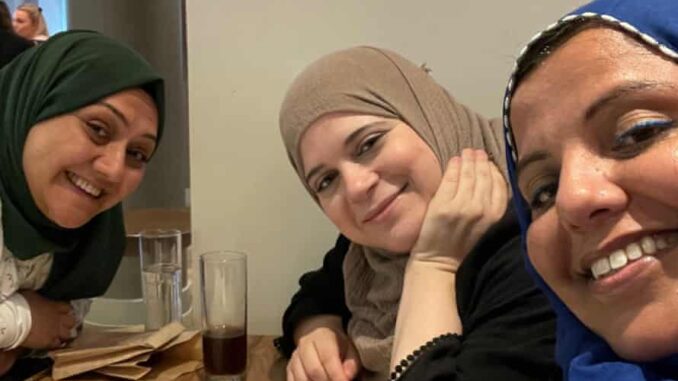
The England team are taking a stand against bigotry, and people like my friends and me feel they’re playing for all of us
What happens when three hijabis walk into a bar in central London to watch the Three Lions? Well, one of their tweets goes viral, triggering an emotional conversation about football, Gareth Southgate’s unapologetically anti-racist, anti-homophobic England, belonging, and why representation matters.
On Saturday, I travelled to London from my home city of Oxford to meet two of my most treasured friends. I’ve not seen them since the start of the pandemic. We were on a mission to hug each other, laugh together and watch the England game. My friend Huda travelled from Wembley to meet us; she lives a stone’s throw away from the stadium’s famous arch, which you can see her from her flat. Her sons do basketball training every Saturday in Raheem Sterling’s old school.
Yet Huda had never set foot in the stadium or watched a football match until I encouraged her to join me and my nieces to watch the England Lionesses play Germany in 2019. Up until this point Huda told me, “Football had never made me feel welcome or feel like I belong. I never felt safe to go to a football game because I didn’t feel anyone would watch my back and protect me from racist harm.”
Huda was born and raised in Baghdad and arrived in London as a refugee, learning English as a teenager. Our friend Amna, a mixed-race Libyan-English woman, travelled from Manchester to meet us.
There are many threads and bonds that connect us – we are all the daughters of working-class Muslim migrants, and until last Saturday I was the main footie fan. Amna arrived in England from Libya when she was a child. Her family were among the people of colour on her London estate who were subjected to daily violence and harassment, including being spat at in the street, from far-right groups in 1990s. Dog excrement was posted through doors and at night stones would be thrown at their windows.
Football is known as the beautiful game, but racial minorities have often seen its ugly side: the racism, homophobia and misogyny of the crowds. I’ve spent my whole life working hard, in all the spaces I work and operate in, to create an inclusive environment for all of us to be seen, heard and valued.
And I’ve always absolutely loved football. I was born and raised in Oxford and lived directly opposite Oxford City’s old ground on Marlborough Road. I used to watch the football from my parents’ bedroom, the floodlights streaming into the room. I didn’t know any other working-class Pakistani women who loved football, but that didn’t stop me. When I was a teenager I spent one lunchtime in the school library with a friend penning a poem about Eric Cantona, which was published in Manchester United’s magazine. I still remember one of the verses: “Poet, philosopher, artist and supermodel, We’ve got Cantona, forget Chris Waddle.” I know, right? Pure genius.
I started watching England in the 1990s and, more often than not, I would go to Wembley by myself – as friends who looked like me would not feel safe to join me. I’m very stubborn and I refuse to let anyone shrink my world or my life based on their idea of who I am or what I should be. I told myself a long time ago that I belong everywhere, and this is how I live my life. But this has meant I have been subjected to increased Islamophobia, racism and misogyny over the years while watching football.
Three years ago, I got on a train with my mum and travelled to Milan. We went to visit the mighty San Siro stadium. I was so excited: I grew up on Italian football on Channel 4, and still have the most vivid memories of Italia 90. On one of the San Siro’s pillars someone had scrawled “Van Basten was here”, and I almost cried with joy because I thought: “Yes, he was! And now so am I.” On the way back to our hotel, as we were waiting to cross the road, a man in a car with its windows open slowed down and stopped. He was staring at us: staring with hatred. As we started crossing he did a Hitler salute.
People of colour and marginalised people know we are a tiptoe away from racism and bigotry, which is why Gareth Southgate’s inclusive England team is winning so many hearts. By taking the knee, by standing against homophobia and bigotry, this team is playing for all of us.
On Wednesday I will be watching England v Denmark at home by myself – because I’m too nervous to watch it with friends. If we go to penalties, I will be diving behind the sofa and staying there. However, I’m among millions of other England fans who now feel seen and heard – like never before.
- Shaista Aziz is an anti-racism campaigner and a member of the FA’s Refugee and Asylum Seekers Football Network


Be the first to comment